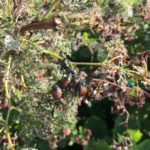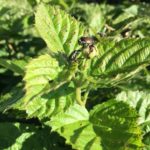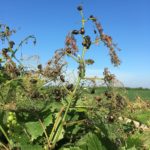Japanese beetles appear to be especially abundant this year. They started showing up a couple of weeks ago and are now numerous in many areas. This past year Japanese beetle populations were higher than they have been for a number of years and this year looks to be a repeat. We’ve seen severe damage to small fruits, grapes, as well as the Pristine apples, plums, etc. Adult beetles are relatively easy to control, but after insecticide treatment to knock them down, populations reappear as the insecticide wears off. So, it may require more than one application to control them. Sevin and the pyrethroids will provide the best control, although Sevin may only give about 3 days of protection. Watch pre-harvest intervals (PHIs) in small fruits if harvest is on-going. And note that the REI for Sevin can be 2 to 6 days in grapes.
One note about damage: It often looks a lot worse than it really is. Beetles tend to congregate along edge rows or row ends adjacent to grassy areas. Don’t assume the pickup truck view of the planting is representative of the entire acreage. Another issue is that Japanese beetles feed primarily on the upper leaves of most plants. Grapes can withstand a significant amount of defoliation without significant loss of yield or fruit quality. The same can be said for apples and other tree fruit. However, in some cases the damage can result in direct loss of yield or fruit quality. Raspberries can be severely affected by uncontrolled feeding. And in some crops, such as primocane fruiting blackberries, Japanese beetles feed directly on flowers, reducing potential yield considerably. In blueberries and peaches they feed directly on ripening fruit leading to a direct loss of yield and reduction in fruit quality. Get out of the truck and scout your planting today!
- Japanese beetle feeding damage in red raspberry
- Japanese beetles on red raspberry
- Japanese beetles feeding on PF blackberry flowers
- Japanese beetle feeding damage in grapes



